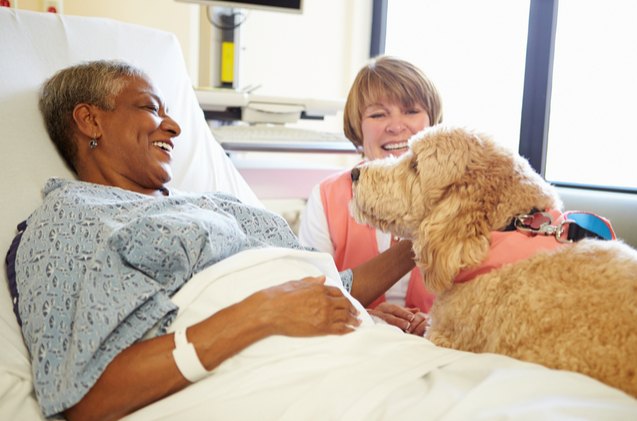Therapy Dogs Lend a Helping Paw to Cancer Patients and Hospital Staff

Therapy dogs don’t have the same role as service dogs, although they’re often being mixed up. Unlike professionally trained service animals who act as guide dogs or detect seizures, therapy dogs are volunteers whose friendly personalities and excellent manners make them suitable to comfort and emotionally support humans in need of furry companionship.
The time spendy cuddling with a friendly dog has a positive influence on one’s well-being. Not only that it will boost your mood, but it will also lower your blood pressure, improve cardiovascular health, and even decrease pain, among other benefits. A recent article published in the Clinical Journal of Oncology Nursing indicates that even cancer surgery patients and hospital staff could have a lot to gain from including therapy dogs in their usual routine.
The study monitored 100 patients- half of them didn’t get any visits from a therapy dog, while the other half from the animal-facilitated therapy group, received a 10- to 15-minute visit each day from the Caring Canines. Therapy dogs visited the surgical oncology recovery unit four times a week in the company of their handlers.
The effects of the pet therapy program on the staff and the patients were evaluated through surveys and questionnaires. The researchers themselves admit that it was challenging to make a “quantitative assessment of psychological variables,” but the answers to the open-ended questions were overwhelmingly positive. Patients said that the visits were “uplifting” and made them feel like they had a “connection to their home.” The hospital staff didn’t stay behind in their raving reviews of the Caring Canines program, saying that therapy dogs “put a smile on everyone’s face” and “made a stressful day better.” As it was to be expected, none of the participants reported adverse feelings or experiences with animal-facilitated therapy.
While the results are far from definitive and conclusive, we already know that there is scientific proof that pets improve our well-being. So why wouldn’t we assume that pet therapy programs have genuine benefits as well?

A proud mama to seven dogs and ten cats, Angela spends her days writing for her fellow pet parents and pampering her furballs, all of whom are rescues. When she's not gushing over her adorable cats or playing with her dogs, she can be found curled up with a good fantasy book.
More by Angela Vuckovic























